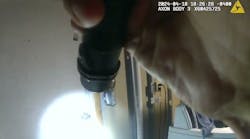BUTTS COUNTY, Ga. -- Andrew Allen Cook, who murdered a Mercer University couple at a Lake Juliette lover's lane 18 years ago, was executed at the state prison here Thursday night.
Cook was scheduled to die by lethal injection at 7 p.m. at the Georgia Diagnostic and Classification Center near Jackson. But the execution was delayed by about four hours as lawyers and prison officials waited to hear from the U.S. Supreme Court.
Cook was led to the death chamber about 10:45 p.m. He was pronounced dead at 11:22 p.m.
In his final statement, Cook, 38, seemed remorseful.
"I would like to apologize to the victims' families. ... I apologize. It was senseless, I'm sorry," he said. "I know y'all cannot forgive me. I'm not going to ask y'all to."
Though none of his family members were there, Cook said he was sorry for them, too.
The Supreme Court began reviewing Cook's latest appeal about 6 p.m. The court finally denied Cook's bid to postpone the execution at about 10:30 p.m.
Cook was 20 years old in January 1995 when he happened upon Mercer students Grant Hendrickson, 22, and Michele Cartagena, 19, as the two sat in her brand-new Honda Civic at the lakeside a dozen or so miles north of Macon. Cook didn't know his victims.
The youngest of four children, he had lived with his mother in Jones County before moving into a trailer northeast of Gray.
He sometimes fished at Lake Juliette.
He was alone the night of the killings, out for a late drive after playing pool and drinking a beer with a friend.
It was past midnight when Cook wheeled up at the lake shore in his low-rider 1987 Honda CRX. Armed with an AR-15 assault rifle, he got out and fired 14 bullets into the couple's car. He squeezed off five more blasts with a 9mm pistol.
The slain students' bodies were found by a camper about seven hours later, shortly after daybreak on Jan. 3, 1995.
By then, Cook was long gone.
Nearly two years passed before investigators suspected him. They closed in after linking him to the murder weapons and, later, through a DNA saliva match, to tobacco spit they found on Cartagena's left thigh.
While in custody soon after his arrest, Cook confessed to his father, an FBI agent.
Cook's only known explanation for killing the couple came in the days before he was jailed. Cook, who worked at a diaper plant, sensed police were onto him. An investigator was calling people who knew him, asking questions. Without going into specifics, Cook confided to a co-worker that he'd killed someone "to see if I could do it and get away with it."
Hours after Cook was locked up on Dec. 5, 1996, authorities let his father, John, in to talk with him. At one point, John Cook put his hand on his son's shoulder and said, "What you did was bad, very bad. ... There will be some super-serious consequences."
The slayings of Cartagena, from Columbus, and the Macon-raised Hendrickson stunned locals and baffled authorities.
The tall, dark-haired Cartagena, her parents' only child, was born in California. Her father, Luis, was a lieutenant colonel in the Army. He retired at Fort Benning.
Before enrolling at Mercer, Cartagena was valedictorian at Spencer High School. She played softball, volleyball, tennis and ran track.
Not too long ago, a caretaker at Parkhill Cemetery in Columbus told a visitor that her father shows up at her grave every morning. It bears the inscription: "Our Pride And Joy."
Hendrickson, also an only child, was an honor graduate at Tattnall Square Academy. He went to Highland Hills Baptist Church. At Mercer, he was a cheerleader, a senior majoring in physics and electrical engineering.
His grave marker at Riverside Cemetery reads: "Grant," and beneath it, "Beloved Son."
In fall 1996, gun-sale records at a Macon pawn shop where Cook hocked his assault rifle helped investigators zero in on him.
Cook's apprehension in December 1996 drew international media attention. Over the years, details of the case have been fodder for network news programs and true-crime TV shows.
Cook was convicted in March 1998 and sentenced to die. At the time, People magazine quoted courtroom testimony from his father, pleading for his son's life: "The prosecution has painted him as being a heinous monster. But I see him as a little boy, and there is a spark of goodness in him."
Thursday evening, Andrew Cook ate a last meal of fried shrimp and steak with a baked potato and potato wedges. He had lemon meringue pie for dessert.
About six hours later, a deep-yellow door opened and half a dozen corrections officers escorted him backward into the cream-colored, 15-foot-wide death chamber. Outside, amid the drone of nearby Interstate 75, a pair of shotgun-toting guards stood sentry facing a pair of basketball courts.
Cook, his eyes glassy, was led to a gurney, seated and methodically strapped down. First his left ankle, then his right. A seat belt was cinched around his knees. He looked scared, gaunt. His arms were spread and bound to slats poking out the sides of the gurney. Officers later taped his fingers and palms to the slats.
Cook kept his eyes open, gazing at the ceiling where four microphones were embedded in the acoustic tile.
There were socks on his feet, no shoes. He wore a white prison suit with blue stripes down the sides. A harness over his shoulders locked down his torso.
Before long, two women dressed like nurses rolled in a cart. They taped two wires to his chest. The wires ran to a heart monitor behind a curtain. The women each stuck an IV in his arms.
Guards tilted the gurney maybe 15 degrees so Cook's eyes could just see a four-panel window where, on the other side, three dozen people would soon watch him die.
A pair of guards stood over him and, with robotic, military precision, unfolded a sheet. They used it to cover all but his arms and head.
A little after 11 p.m., with Hendrickson's mother in the front row of the witness room, Cook offered his apology.
He said he didn't expect to be forgiven, adding, "I know I couldn't do it myself."
The warden then asked if he wanted a final prayer. Cook said no, so there was none.
Nearly two decades ago, though, there had been prayer. A prayer Cook would never hear.
It was said before Thanksgiving 1996 in the Milstead Church of Christ in Conyers.
Randy Upton, a former GBI agent who was instrumental in catching Cook, worshiped there.
Upton had just been assigned to investigate the Lake Juliette double murder, which had gone unsolved for 22 months. Upton became so obsessed with cracking the case that his wife referred to it as his "other woman."
One Sunday, Upton carried the bulk of the case file to church. When the service ended, after most everyone was gone, he placed the file on the altar.
"I wanted to ask for divine intervention," Upton recalled, "for God to point me in the right direction."
Within a couple of weeks, Cook was behind bars.
Recently, Upton said, "I just wonder what's gonna pass through his mind as he's lying there on the gurney. I'm hoping he'll say, 'I'm sorry for what I did.'"
Upton was in the witness room Thursday night. He sat in the second of three rows of wooden pews, and he was listening.
He was glad to hear Cook's apology, but said later that as Cook lay dying, "all I could think about was Grant and Michele's faces."
If you travel northwesterly in a straight line from the Monroe County lakeside where Cartagena and Hendrickson were shot dead, it is 22 miles to the prison where Cook's life ended.
"I believe that on January 3, 1995, the death angel passed over Lake Juliette," Upton said the other day. "It was obvious that his intent was to claim three lives that night. He used Andy to help him claim two innocent lives. ... (Now) the death angel will pass over the area to claim the third one he left behind. ... I pray that God has mercy on his soul."
Copyright 2013 - The Macon Telegraph
McClatchy-Tribune News Service


